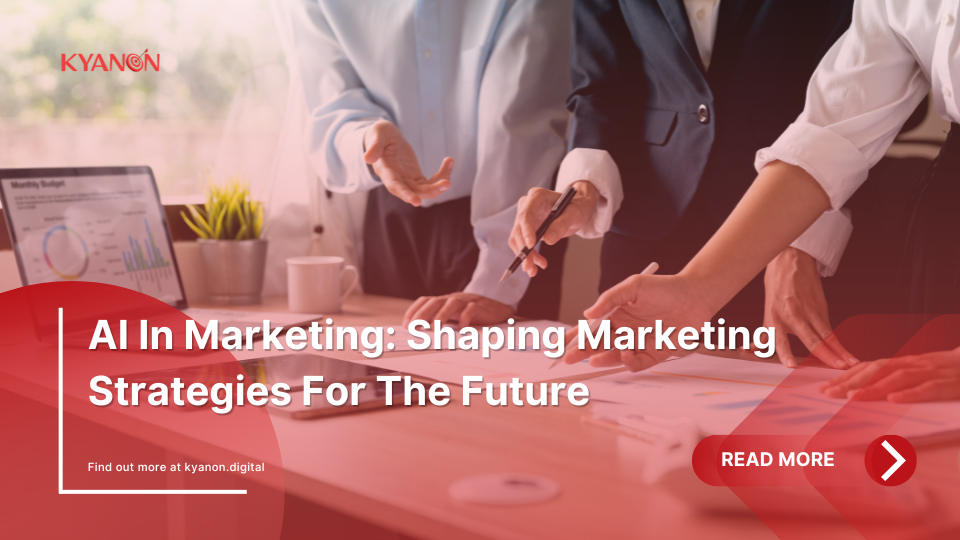The application of AI in marketing is gradually creating a revolution, reshaping how businesses connect with their customers. In the modern-day context, data-driven marketing has become the dominant trend, as companies recognize the value of leveraging customer information to adjust their business plans accordingly.
AI is crucial in transforming vast amounts of data into useful insights, helping businesses adjust their strategies for maximum effectiveness.

1. Growing Demand for Data-Driven Marketing
Data-driven marketing is an effective approach where marketing plans are developed based on deep customer data analysis. This method helps businesses improve advertising effectiveness and enhances their ability to meet customer demands by providing personalized products and services tailored to individual preferences.
One of the greatest benefits of data-driven marketing is its ability to generate deep customer insights.
By analyzing big data from various sources, such as transaction histories, social media interactions, and customer feedback, businesses can identify different demographic groups’ behavior trends, preferences, and needs. This enables them to adjust advertising campaigns, media content, and customer experiences for optimal results.

Facing massive data, businesses must change their approach to gathering and analyzing information. AI is a powerful ally to help businesses optimize marketing strategies more effectively and accurately.
2. How AI Enhances Data-Driven Marketing
AI not only helps analyze data but also has the capability to learn from it. This means that AI can continuously improve its predictive capabilities and optimize marketing strategies.

AI can quickly and accurately process and analyze vast amounts of data. Technologies like machine learning and predictive analytics enable businesses to analyze customer behavior and forecast future trends. For example, if a company discovers that customers are interested in scarves during winter, AI can help predict and plan advertising campaigns at that time, increasing the chances of success.
3. Key Applications of AI in Marketing
AI brings many useful applications to marketing, helping businesses enhance efficiency and improve customer experiences.
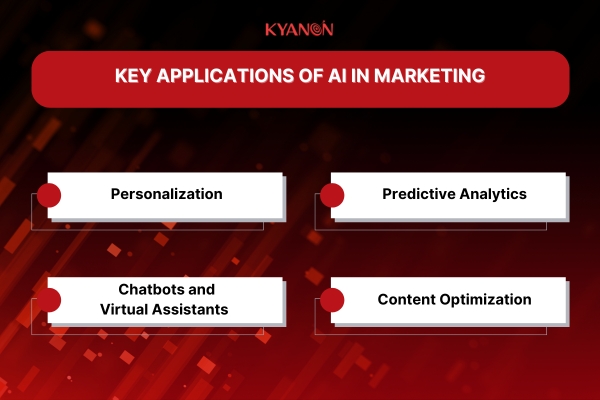
3.1. Personalization
One of the standout applications of AI is personalizing customer experiences. AI can categorize customer segments based on behavior and preferences, creating targeted marketing campaigns for each group. For instance, e-commerce platforms use AI to provide product recommendations based on customers’ browsing and purchasing histories.
3.2. Predictive Analytics
Predictive analytics allows businesses to forecast future customer behaviors based on historical data. This optimizes marketing campaigns and helps identify the ideal times to reach customers.
3.3. Chatbots and Virtual Assistants
The rise of chatbots and virtual assistants has transformed how businesses interact with customers. These tools are integrated into company websites and provide immediate support, answering inquiries and guiding customers through shopping, thus enhancing the user experience.
3.4. Content Optimization
AI can analyze content performance across social media and websites, offering suggestions on improving content quality to attract more customers.
4. Benefits of AI in Marketing
AI brings numerous benefits to businesses in the marketing field.
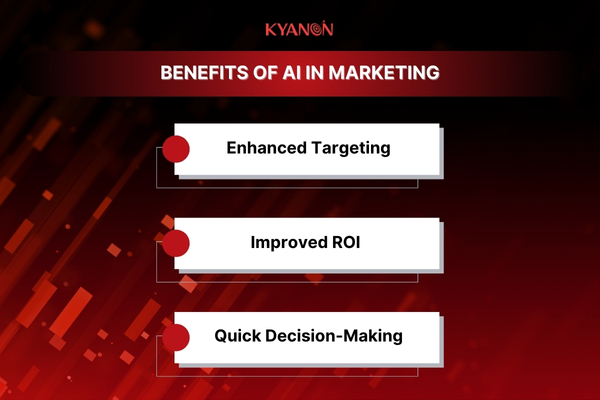
4.1. Enhanced Targeting
AI helps businesses improve targeting and personalization of marketing campaigns. By analyzing data, AI allows marketers to identify high-potential customer segments to focus on, optimizing advertising campaigns’ performance.
4.2. Improved ROI
One of the significant benefits of using AI in marketing is its ability to improve ROI. AI optimizes advertising spending and targeting accuracy, meaning companies can generate more revenue with less expenditure.
4.3. Quick Decision-Making
AI provides real-time insights and analytics, enabling businesses to make faster and more accurate decisions. Real-time campaign optimization can yield significant benefits, allowing businesses to respond promptly to market demands.
5. Challenges and Considerations when applying AI in Marketing
Despite the numerous advantages AI offers, there are also challenges businesses must address when utilizing such technology.
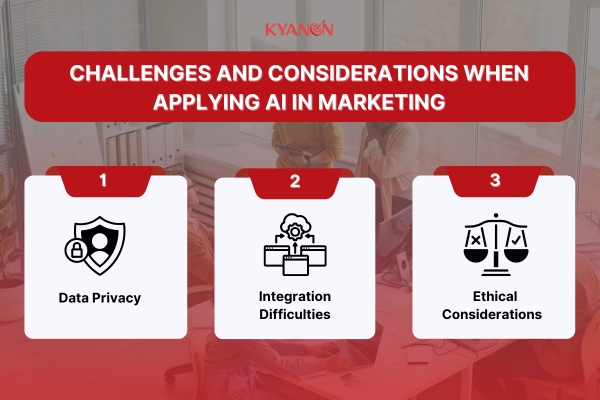
5.1. Data Privacy
One of the biggest concerns is data privacy. Customers are increasingly sensitive to how their personal information is collected and used. Therefore, businesses must ensure compliance with data protection regulations and build trust with their customers.
5.2. Integration Difficulties
Integrating AI into existing systems can be challenging, especially for smaller businesses lacking the necessary resources and expertise.
5.3. Ethical Considerations
Ethical considerations in the use of AI are crucial. Businesses must ensure they use AI fairly and transparently, avoiding negative customer impacts.
6. Future Trends of AI in Marketing
The future of AI in marketing promises to be bright, with several emerging trends. Here are some key trends businesses can expect to develop:
6.1. Predictive Marketing
AI will increasingly play a central role in predictive marketing, allowing businesses to understand current customer behaviors and predict future trends and demands. AI can identify patterns and potential trends by analyzing historical data and online behavior.
For instance, if many customers search for health-related products at a certain time of year, AI can predict that this trend will continue and suggest relevant advertising campaigns.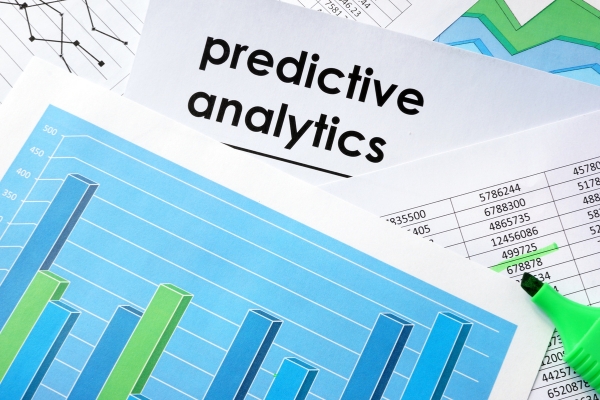
Predictive marketing is reshaping how businesses connect with customers by using data-driven insights to anticipate behaviors and tailor personalized experiences. From Amazon and Netflix to Tesla and Coca-Cola, companies across industries are leveraging this powerful tool to optimize engagement, drive innovation, and boost ROI. Here’s a look at how leading brands are successfully applying predictive marketing to stay ahead in their markets.
6.2. Voice Search
With the rise of voice search, marketing will become more user-friendly, providing a natural experience for consumers. AI will evolve to better understand and process language, optimizing content and advertising for voice searches.

For example, a customer might ask, “I need to find the best running shoes,” and AI will analyze this query to provide suitable products along with details such as reviews and offers. This not only enhances user experience but also drives conversion from search actions to shopping actions.
6.3. Omnichannel Experience
AI will play an essential role in developing omnichannel experiences, where customers can interact with brands seamlessly across multiple channels.
This means customers can start a conversation on a website and continue it on social media or a mobile app without interruption. AI helps connect all these channels, ensuring that customer information and experiences are consistent and cohesive. This experience eventually makes them feel better cared for throughout their shopping journey.

Businesses will apply AI to integrate information from websites, social media, email, and mobile apps, creating a comprehensive picture of customer behavior and preferences. This allows brands to send consistent and personalized messages to each customer, regardless of the channel they interact through. AI can analyze real-time data to provide relevant recommendations and offers, ensuring that customers receive the best experience at every touchpoint.
The omnichannel experience is redefining how businesses engage with customers, offering seamless and integrated interactions across multiple touchpoints. From Nike and Starbucks to Sephora and Disney, leading brands are using omnichannel strategies to create personalized, consistent, and connected experiences. By aligning digital and physical channels, these companies are driving customer satisfaction, loyalty, and business growth.
7. Conclusion
AI is revolutionizing the realm of data-driven marketing, opening up new opportunities for businesses. Companies should quickly familiarize themselves with AI and integrate it into their marketing strategies to thrive in the market.
This optimizes workflows and provides valuable insights, improving customer satisfaction. By leveraging AI technology, businesses can enhance their marketing effectiveness and build stronger relationships with customers in the future. To maximize the potential of AI in marketing, contact Kyanon Digital. With a team of experienced professionals, we are always ready to partner with you in building the successful business you desire.
